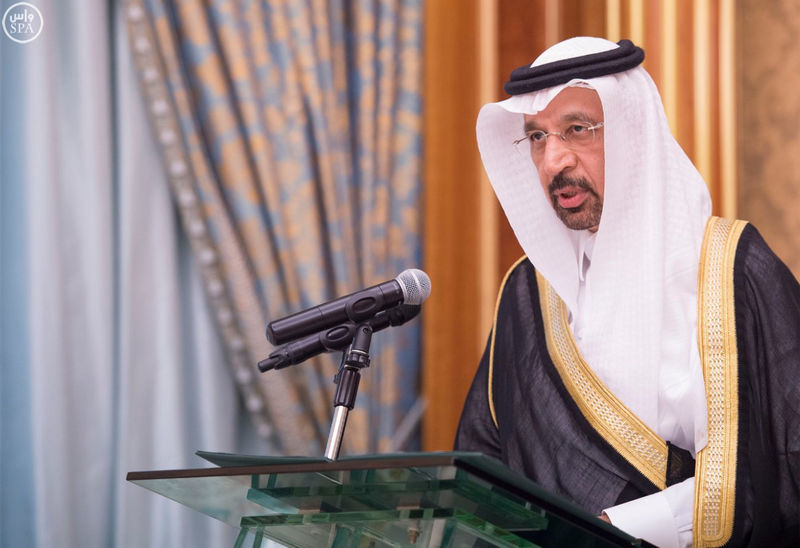By Alex Lawler, Rania El Gamal and Reem Shamseddine
VIENNA (Reuters) - For OPEC watchers, every little detail matters.
When the oil producer group holds its half-yearly meetings, what time the ministers arrive in Vienna, how they speak and which hotel they stay in - anything will be analysed in an attempt to predict its policies.
So it was seen as a sign that new Saudi Energy Minister Khalid al-Falih takes OPEC seriously when he turned up in the Austrian capital on Monday, three days before the Organization of the Petroleum Exporting Countries' upcoming discussions.
But Falih will have little opportunity to see fellow ministers ahead of Thursday's meeting. Many of them, including those from Iran and Venezuela, won't show up in Vienna until midday or even late on Wednesday.
For veteran OPEC watcher Gary Ross, founder of New York-based consultancy PIRA, that signals expectations should be low as far as OPEC policy is concerned.
"These guys are not exactly getting along these days," Ross said. "OPEC is becoming far less important. We are entering an era when market management will be non-existent".
One exception to the later arrivals was UAE Oil Minister Suhail bin Mohammed al-Mazroui, who told journalists in Vienna on Tuesday that he was happy with the oil market, suggesting OPEC should refrain from action at this week's meeting.
"We need to wait. The market will fix itself to a price that is fair to the consumers and the producers," Mazroui said.
"This year is a year of correction. The rules of the market, that is supply and demand, are working and I think that is the essence of this policy."
OPEC last decided to change output in December 2008, when it cut supply amid slowing demand due to a global financial crisis. By contrast, between 1998 and 2008, OPEC made 27 changes to output.
For decades, Saudi Arabia, Vienna-based OPEC's largest producer and de facto leader, had a preferred range for oil prices and, if unhappy, would try to orchestrate a group-wide production cut or increase.
But a technology-driven spike in non-OPEC output such as that of U.S. shale and growing fuel efficiency led Riyadh to conclude that the era of fast oil growth might be ending.
In the past two years, Riyadh has stuck to a strategy of fighting for market share, thinking that pumping more oil now at low prices is better than producing less in the future.
"We think continuity will carry the day at the June OPEC meeting in Vienna. The only real uncertainty is how divisive the meeting will be and how much discord will be put on public display," said Helima Croft, head of commodity strategy at RBC Capital Markets.
FIGHT FOR SHARE
Unlike his predecessor, Saudi oil minister Ali al-Naimi, Falih has a much larger portfolio overseeing energy, industry, mining, atomic power and renewables.
On Tuesday, Falih visited OPEC headquarters to meet Secretary-General Abdullah al-Badri, staying for 90 minutes in a clear display that despite being a busy man, he has time for the producer group.
"There are times when you need OPEC and when you don't. You only need OPEC when you have major oversupply and OPEC doesn't want prices to crash any further," Ross said.
Oil prices have recovered to around $50 (£34.5) per barrel in recent weeks from their lowest in a decade of $27 per barrel in January - but are still far below the $115 seen in June 2014.
Prices crashed after Saudi Arabia increased production to an all-time high to fight for market share with higher-cost producers, including U.S. shale firms.
The drop in prices also badly hurt fellow OPEC members, with production declining from Nigeria to Venezuela.
Iraq and Iran, however, kept pushing production higher as Baghdad sees recent investments by oil majors pay off and Tehran regains market share after the lifting of some Western sanctions in January.
Falih's ultimate boss, Saudi Deputy Crown Price Mohammad bin Salman, has said Saudi Arabia may raise production further if other members don't restrain their output increases.

"As long as Mohammed bin Salman is in charge, I don't think anything reasonable (OPEC action) can happen. This policy has hurt not only the exporting countries, but companies and the industry," a non-Gulf delegate said.
(Additional reporting and writing by Dmitry Zhdannikov; Editing by Dale Hudson)